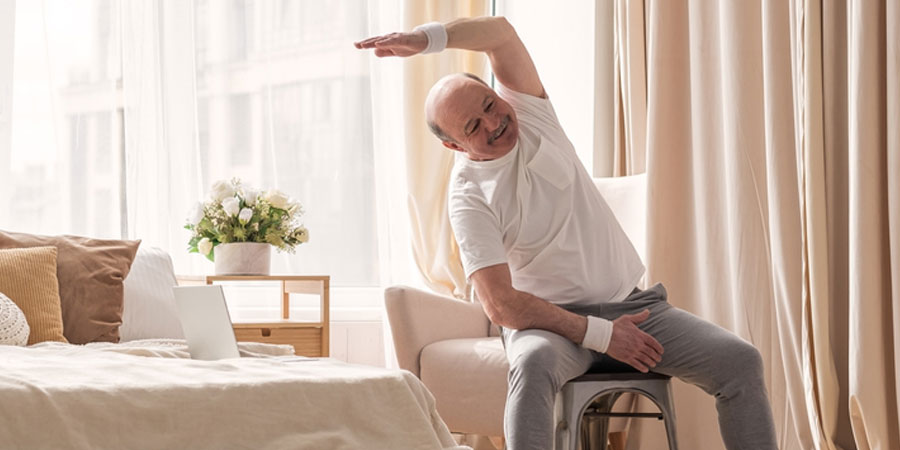
As people age, their world can become smaller and often more lonely. Loved ones may have moved away or even passed away.
As people age and go out less often, pets become part of the family and provide much-needed loving companionship. They can bring joy to your everyday life, no matter your age. Here we will look at the benefits of pets for the elderly and which pets are best for older adults.
What are the benefits of keeping pets for the elderly
The Pets For The Elderly Foundation is a charity connecting therapy animals with older adults. Here are some proven benefits of pets for the elderly taken from research the Foundation has collected.
Physical Benefits
Heart Health — Spending time regularly with a pet can lower blood pressure and cholesterol and therefore decrease the risk of cardiovascular disease.
Improved Activity — Walking, grooming or playing with a pet frequently increases the time spent doing physical activity and exercise, which in turn has countless health benefits.
Healthy Behaviour — Pet owners tend to take better care of themselves in general. Caring for a pet helps to develop a routine which encourages owners to maintain better routines to eat regularly or complete chores and other tasks.
Social & Emotional Benefits
Increased Interaction — Walking a dog gets older adults out of the house and increases their opportunities to socialise with neighbours, friends, family or strangers in the park.
Decreased Loneliness — Pets provide companionship, giving older adults a source of love, affection, conversation and activity.
Stress Relief — Being with a pet increases levels of the “feel good” hormone, serotonin, which relieves stress. It also provides physical touch contact, which helps to calm anxiety as well as many other benefits.
Better Self-Esteem — It can be hard coming to terms with getting older and the limitations it can bring with it. Pets are a welcome reminder to older adults that they are still loved and needed.
Sense of Purpose — Owning an animal gives someone a reason to get up in the morning. Pets combat depression symptoms by eliminating feelings of worthlessness or helplessness. Knowing they are loved and needed enhances an older person’s mental health.
Memory– Pet ownership is also thought to help preserve memory and thinking according to research presented at the American Academy of Neurology’s 74th Annual Meeting.
They found that long-term pet ownership is linked to lower levels of memory and thinking decline in those over the age of 50 compared to those who did not have a companion animal.
What is the best pet for an older person?
Cats
Cats can be just as friendly and loveable as dogs but need less looking after. Generally, they are low maintenance and live more independently than dogs. Of course, this also depends on the breed and age of the cat. Kittens will have more energy and may require extra time and attention compared to an older cat. The personality of the cat should also be taken into consideration where possible, especially if adopting an older cat. The breed of the cat will also affect how much care it will need. For example, some pedigree cats need a lot of grooming.
Dogs
Dogs are considered to be one of the best pets for older people. Owning a dog requires care and attention to be given every day. This can give older adults a purpose and a focus each day, especially for those who struggle to give up a busy lifestyle. Walking a dog twice daily provides an elderly person with a reason to get up and out of the house for some fresh air and exercise. Dogs are also a great conversation starter to get an elderly person socialising with people they meet. Very often dog owners will know the names of all the dogs they meet but not the names of the human owners they chat to daily!
Again, it’s important to take the breed of dog into consideration before deciding. Size, temperament and energy levels can vary greatly and all impact the care needs of the dog.
Bunnies, guinea pigs, hamsters, gerbils
If cats and dogs are not suitable, there are other small furry animals that can provide the same benefits. Rabbits, guinea pigs, hamsters and gerbils are social creatures too. Getting more than one (depending on breed) allows them to keep themselves entertained all day too.
They can be kept inside or outside and need a large enclosure in the garden so they can run around and stretch their legs. They are fairly easy to care for and are perfect for people who can’t commit to walking a dog daily but still want to care for an animal and enjoy some cuddles.
Consider adopting a pet
Puppies, kittens and young animals are always more work and need more time and attention. This is something to consider when searching for a pet for an older adult.
It’s a good idea to consider adopting a pet as an older adult. Rescue centres often have detailed information about the history and needs of the animal which means you can find a pet with a personality that matches perfectly with your own. They will generally be much easier to manage and you will be giving an animal a loving and comfortable home for it to live out its days.
If you are a pet owner who is finding the day-to-day tasks of caring for your pet, yourself or your home are becoming increasingly difficult, Eximius can help. We have a range of care options to help you continue to live comfortably and independently in your own home. Contact us here for more information.

As you get older, it’s crucial to stay active to look after both your physical and mental health.
Regular activity can help your body to stay healthy, enable you to retain your independence, and reduce your risk of developing a range of conditions including heart disease, stroke, type 2 diabetes, some cancers, as well as depression, and dementia.
Being regularly active can also help you to manage your weight, strengthen your muscles and help to stay steady on your feet.
When you exercise, your body releases endorphins which can reduce your perception of pain and trigger a positive feeling in the body.
Exercise for both your body and your mind can improve your mental health by reducing anxiety, depression, and negative feelings, and expand your self-esteem and cognitive function.
But if you don’t know where to start or just need some encouragement or guidance, then check out our top 5 tips for staying active to help you look after your body and your mind.
1. Walking
Walking is considered one of the best forms of exercise, regardless of your age. It’s free, you don’t need any specialist equipment and most people are able to do it.
Aim to get out for a walk at least once a day and make it part of a regular routine, whether it’s on your own or with others.
Walk to a post-box, to the shops, or to your local park, or if you prefer to stay closer to home, enjoy a walk around your garden.
Local groups arrange organised walks for members to enjoy together in a group which can be an excellent way to stay active and socialise at the same time.
2. Embrace technology
The pandemic has encouraged many of us to become more familiar with new technology. Apps such as Zoom, Skype and FaceTime enabled families and friends to stay connected virtually when they were unable to physically be together.
Now that restrictions are relaxing, these apps and others such as social media can still provide invaluable opportunities to improve your mental health and sense of wellbeing.
They can be great tools to keep you connected and able to communicate more effectively with your family and friends, share memories, keep abreast of news in the community, and reach out to people from your past.
The online world also provides numerous e-learning opportunities whether it be physical exercise classes or activities to complement new or existing hobbies and interests. It can also be a source of information on how to access opportunities for physical exercise and social interactions within your local community.
Embracing these technologies can help keep your mind agile, improve memory and increase cognitive longevity, as well as build confidence.
3. Chair exercises
Chair exercises are a safe and effective way to benefit your physical and mental health.
Regularly undertaking a range of chair exercises can increase circulation, coordination, flexibility, strength, posture, and balance. This can reduce the risk of falls and increase your confidence and self-esteem.
Before you begin, make sure you choose a stable chair without wheels or arm rests. Sit with your feet flat on the floor and knees bent at right angles.
Follow professional advice and guidance included in programmes, such as sitting exercises from the NHS to do at home and simple exercises to do at home and chair based exercise classes in the community from Age UK.
4. Pets
Pet ownership has multiple benefits for people in later life. Owning an animal can encourage more activity and provide companionship, affection, and even conversation, alongside sense of purpose and responsibility; all contributing to a greater sense of well-being.
Pets in the home can also increase levels of ‘happy hormones’ in their owners, and can calm anxieties, lower stress levels, and reduce blood pressure.
Dog ownership, in particular, provides the opportunity to undertake regular physical activity outside in the fresh air and enables you to meet new people.
5. Puzzling and gaming
Regularly tacking puzzles and games can provide a great mental workout. Puzzles such as Sudoku or word searches, or, playing games like chess, bridge, or bingo can improve memory, concentration, cognitive skills, and sharpen logic and reasoning.
They can also provide the opportunity for social interaction and stimulation when playing with friends and family both at home and in the local community.
It’s never too late to start
It’s important to remember that it’s never too late to start making changes to the way you look after yourself, whatever age you are. If you have been inactive for a while, just start slowly and gradually build up.
Keeping both your mind and body active really can improve the length and quality of the life you live.
Our Live-In Carers support our clients in keeping active. They arrange and accompany clients taking part in physical activities within the community as well as providing companionship and regular social interaction inside the home to aid mental fitness. An Eximius Live-In Carer can make staying mentally and physically active in later life just a little bit easier.
If you or a loved one would like to understand more about whether live-in care might be the right fit for you, please get in contact, we’d love to help.

A spinal cord injury is a life-changing event. It affects every part of life, from work, hobbies, exercise, relationships, self-esteem and a person’s overall sense of self.
Recovery and adjusting to a new way of life is not an easy process to deal with. Research shows that the overall prevalence of depression in various spinal cord injury studies can be as high as 78%. Here we will discuss the importance of mental health care following a spinal cord injury.
How Spinal Cord Injuries Affect Mental Health
When a spinal injury occurs, it changes every part of life as you know it. Simple everyday tasks will need to be relearned. Depending on the severity of the injury, some tasks may no longer be able to be done independently. This can have a profound effect on a person’s mental health and cause feelings of depression. Life can feel overwhelming.
Relationships can change. People may treat the injured person differently. People may stare. These experiences can steadily erode self-esteem and identity, worsening mental health.
In addition to this, chronic pain, something many spinal cord injured people experience, is associated with worsening mental health over time.
How poor mental health can impact physical health
Many people are reluctant to admit they need mental health support and continue to suffer in silence. Yet, poor mental health can have a profound effect on physical recovery.
Poor mental health can:
- Reduce motivation to follow through with exercise and treatment regimens.
- Increase the likelihood of physical illness such as infections.
- Affect how a person behaves and their relationship with doctors and caregivers who are helping them with recovery.
Treatment options for poor mental health
There are many different ways to approach poor mental health for spinal cord injured people.
Treatment options can include:
- Medication – available and effective but not always necessary, especially not before trying some of the other options.
- Lifestyle changes – healthy diet, exercise, sleeping well, etc.
- Support groups – no one understands the struggles of life like other spinal cord injured people.
- Trying to keep doing activities that brought pleasure before, even if that means finding a new way of doing them.
- Psychotherapy – learn coping skills and identify problematic thought and behaviour patterns.
- Occupational and physical therapy – improving physical capabilities and relearning new ways to work around the injury can improve confidence greatly.
When to seek mental health care
With such a high likelihood of a spinal cord injured person developing some level of depression or anxiety following their injury, it makes sense to be proactive. It’s much harder to treat symptoms of depression than to try and prevent it in the first place. Maintaining a healthy lifestyle, staying socially engaged, remaining motivated to engage in physical rehabilitation and connecting with people in the same situation can all go a long way towards improving and maintaining the mental health of a spinal injury survivor.
Support at home
Eximius live-in care provides a range of care and support packages ranging from simple companionship to complex care needs.
If you or your loved one would benefit from support or companionship at home, please get in touch for an informal chat to see how we can help.